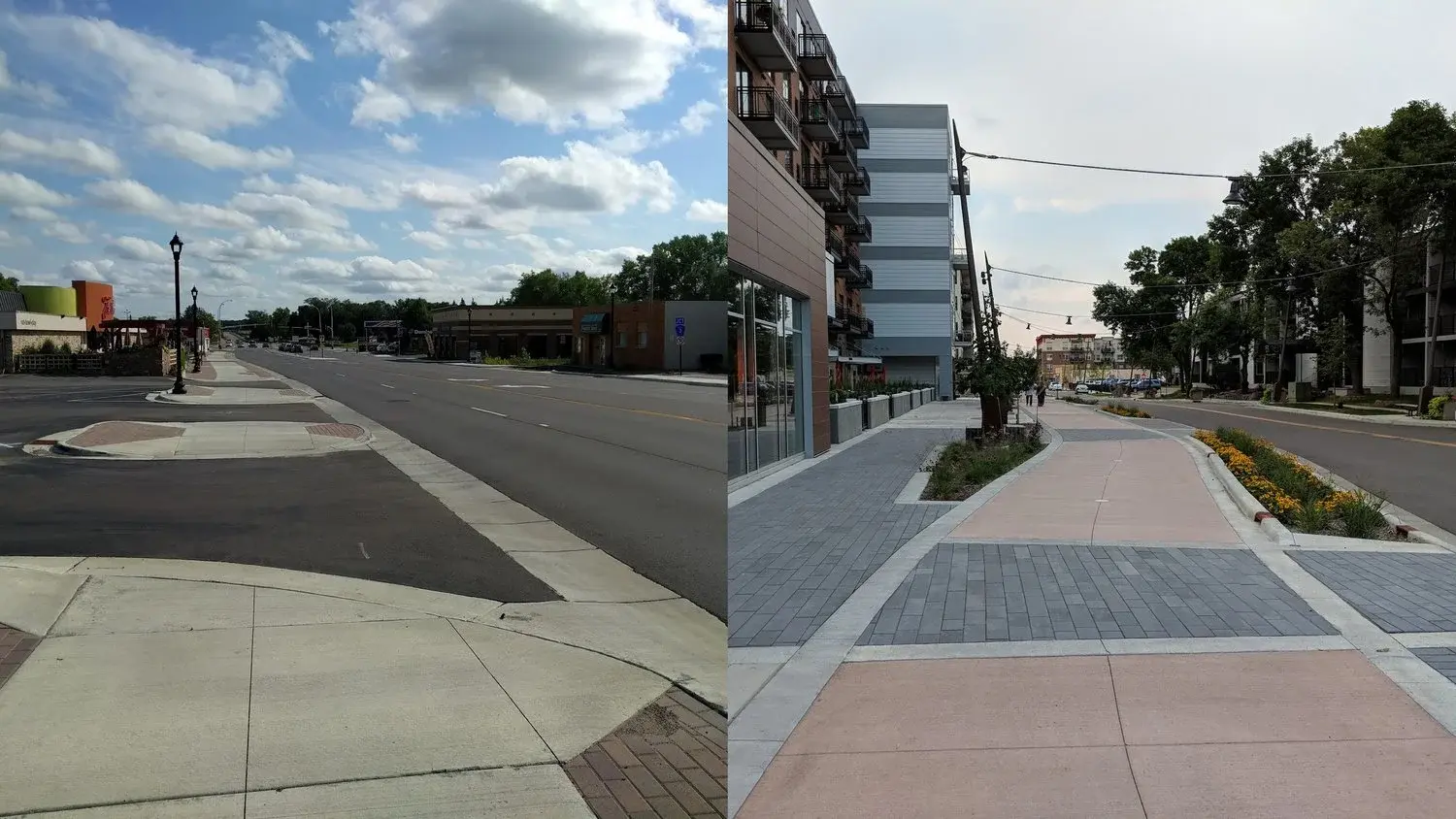Have you ever had a friend return from a vacation and gush about how great it was to walk in the place they’d visited? “You can walk everywhere! To a café, to the store. It was amazing!” Immediately after saying that, your friend hops in their car and drives across the parking lot to the Starbucks to which they could easily have walked.
Why does walking feel so intuitive when we’re in a city built before cars, yet as soon as we return home, walking feels like an unpleasant chore that immediately drives us into a car?
This is a good article. Has a lot of examples showing why streets have a good or bad pedestrian experience.
It’s not as simple as number of lanes or even the quality of the sidewalk. A lot of it really comes down to development patterns. You can really feel the difference when you’re in a place not built for walking. Being on a well constructed sidewalk far away from any buildings because there’s a giant parking lot in between just feels wrong.
There are a few places very close to my house I refuse to walk to because the pedestrian experience is terrible. You feel out of place, unwelcome, and unsafe.
Difference is probably mostly related to the width of the street. Crossing two lanes is fine, four is uncomfortable and six feels impossible. European strees tend to be much narrower than american ones, so people are more inclined to walk.
Not just the width of the street, but the pedestrian infrastructure surrounding it too!
Walking to the nearest corner store from my home requires me to cross the same 2 lane road a total of 4 times, unless I feel inclined to ignore the sidewalks and step on strangers’ properties.
There’s definitely not just one thing about any given street that makes it pleasant or unpleasant.
Street widths do not matter, for example, if the urban design makes it such that there’s no need to cross the street. If the highway doesn’t bisect a community in the first place and there’s no compelling need to cross it, it affects nothing. Similarly, if there are pleasant and safe ped underpasses/road overpasses, the width still doesn’t necessarily matter (but ped bridges are almost universally terrible because they have to be SUPER high to account for large vehicles, making them awful to use).
Similarly, even a 2-lane road can be incredibly hostile to pedestrians. In my small city, we have a few major 1-way roads theoretically designed to get cars rapidly in and out of downtown. To make the roads “work better” they have no on-street parking, are somewhat wide (for the city) laned, and have limited stops (the few stops they do have are signaled). They are way too fast, considering they are residential roads lined with fairly dense historic houses. The sidewalks are somewhat narrow and tree canopy is poor, meaning if you’re on these sidewalks you’re pretty sun-beaten. No one local walks these roads. They go over a block or two to get in a less oppressive route.
edit- and to be clear, going over a block to a more ped-friendly route isn’t even necessarily a problem… if the route one or two blocks over was primarily for bikeped. Segregated modalities is a pretty good compromise for an old city like mine, with enough density to largely support it. But no, those routes are ALSO primarily for cars, they have just not been optimized quite as much.
I agree that even small streets can be pedestrian hostile. I live off of a road where most homes were originally .5-1 acre lots built in the early 1960s. Few of the original houses remain unchanged. Most have either been subdivided to build infill homes or torn down to build even more homes (think 3 or 4 SFH replacing 1).
The street design remains unchanged. Two lanes with no sidewalks and drainage ditches on either side of the road. The road is signed 25 mph but most drivers go 35-40 since it is straight and unimpeded for almost half a mile. Pedestrians must either walk in the street and hope drivers go around them or cross the road multiple times to find a flat surface not at the bottom of a 3 foot deep ditch. Since the city considers the road to be an important connector, they refuse to install speed bumps or other traffic calming. There has been a plan to build sidewalks for almost 25 years but it keeps getting pushed back since the project will require burying utilities, tons of fill dirt, and a rebuild of a bridge over a small creek.
IMO the pedestrian infrastructure and presence of things to walk to matters far more. There’s a 4 lane road in my city that goes by the university area and it’s fine because that area was designed with walking in mind. The area is full of high rise apartments, countless restaurants, a world class university, a massive park, and has a nearby LRT. There’s even a pedestrian overpass.
Speaking of overpasses, I noticed really great underpasses when I visited Warsaw. They had some really large streets, but they weren’t an issue cause you could just go under the street (and that was also filled with shops). I found Warsaw to be a very walkable city and it was largely because of stuff like underpasses and simply things of interest being close by.
I had a similar experience visiting London but because of the Tube. London’s public transit is literally the best I’ve personally used. Despite being a foreigner, I was able to get to literally everywhere I wanted to go with ease. I only wish Canadian cities would emulate that instead of the States as they tend to do.
Seoul is great for both the subway and the underpasses! When I first went, I wondered why there was a shopping mall underneath every major intersection, ha!
Yeah Ive lived in places that if you look on a map and type stores, restaurants, and etc it’s technically walkable. In practice it’s narrow sidewalks straddling 45 mph roads with cars that are darting in and out of entrances. Whenever you have to cross the street you gotta pray the 45 mph car doesnt come into a right on red too hot and slam ya.
Then after crossing 4 lanes, feeling the wind of dangerously close traffic, and walking past car centric not that great scenery you arrive at your destination. A parkinglot but from the outside. So now you gotta dart past the parkinglot road where drivers are at their worst and finally passed the parking lot before getting into the store.
It’s doable but its not easy or enjoyable, and honestly kinda dangerous when you consider your surroundings, the speed at which cars are traveling, and how due to lack of pedestrian traffic they also dont expect you to be there crossing the street.
It’s notable that there’s vanishingly little evidence that more lanes is correlated with reduced trip times or less congestion for people in cars. I’m not even talking about things like induced demand – just that literally, sometimes turning a 4-lane into a 2-lane or a 6-lane into a 4-lane has minimal impact on trip times on that road. All the world of “road diets” usually makes driving better, not worse.
The more lanes there are, the more points of automobile conflict. Points of conflict are the seeds of congestion.
I usually pedal everywhere i go 🚴♂️
Bikes rule!
Because it’s a parking lot. Name the top five things that people enjoy doing in the parking lot that aren’t parking or driving. You can’t, because it’s an empty lot where humans don’t belong.
- Smoke weed
- Play catch
- Drink a beer
- Skateboard
- Bmx
Sure you can do these things in parking lots, but I expect most people would prefer a more pleasant and dignified space to perform recreational activities in if they were just as common and convenient to find as a parking lot.
I’ll grant you skateboarding & BMX on a technicality, despite those things both definitely not involving walking. Also… do people really enjoy getting drunk or high in parking lots? I’d just assume anyone doing that was homeless or truant.






